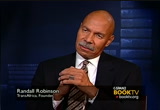tv Book TV CSPAN January 20, 2013 3:00pm-4:00pm EST
3:01 pm
>> of companies that are really dictating food and farm policy in this country. but when you ask most people why, you know, so many children drink twice as many sodas as they did in 1970 or why 35% of adults are obese and 17% of children, most people say kind of a shorthand. they'll say, well, it's the subsidies. people don't really know what's causing the problems with our food system. so what really set me off to read -- to write "foodopoly"
3:02 pm
were a couple of events that happened in a weekend in 2011. i was traveling to a conference out in the midwest. it's part of my job at food and water watch. and i stopped to interview some farmers for an article that i was writing. and over the course of my work at food and water watch, i get to talk to a lot of farmers, but my questions were about how well they were doing, because we look at the census of agriculture statistics, and we know from those statistics that farmers aren't doing so well. so one farmer in particular was telling me a really heartbreaking story. he was thinking about selling his farm, he's a commodity farmer, used to be an independent livestock grower because in states like iowa, missouri, people used to have diversified farms where they raised some vegetables, had some livestock, they grew their own feed x. and that's just simply
3:03 pm
not possible anymore. and he doesn't really have enough land to really make money from commodities, so he's going to sell this farm that's been in his family or for, you know, 200 years. it was a really very sad story. the next day i was at a conference, a food conference, and i was listening to a panel on commodities, and there was a well known and very well intentioned food advocate there speaking. and this person was asked during the question period why is organic food so expensive, and why are people growing so many commodities instead of organic food? and this person answered and, you know, with a straight face it's because farmers get huge subsidies and because of the subsidies today don't grow organic broccoli. and then she went on to basically call farmers greedy welfare queens. i mean, not using that language, but that was the image.
3:04 pm
so i felt, i felt really saddened and upset about this because a better answer would have been because we don't have a fair market for farmers to sell into. and midwestern farmers really don't have the equipment to grow vegetables or the climate to compete with california or all of the places in the developed world where our fruits and vegetables are coming from. so i went home that weekend, and i started writing the outline for "foodopoly." so let's start by talking about subsidies. i mean, this is not a very popular issue, and people often their eyes glaze over. but it's a very important issue. now, i am not here to justify the subsidy system. obviously, it's bad public policy. but blaming all of the ills on the food system on the 17-year-old subsidy system distracts from a lot of the more meaningful issues. and the sub subsidy system is a
3:05 pm
symptom of what's wrong with our food system. it's a band-aid that covers up bad agriculture policies that benefit the biggest food companies in the country and in the world. and we need to reform the food system and the marketplace before we just get rid of subsidies. in fact, if we just get rid of subsidies, we're going to lose a very high percentage of small and mid-sized farms. and we really need farmerrers to be partners -- farmers to be partners in fixing our food system. we don't want to demonize farmers. they're victims of the system as well. so i'm going to ask you to stick with me while i go through some farm history and statistics that are really important if you want to understand how the food system that's making us sick really operatesment -- operates. now, we know that experts from all sides of of the political
3:06 pm
spectrum often. you'll often hear that only the largest farms get subsidies while small farms get nothing. remember that saying that mark twain really popularized lies, damn lies and statistics? well, it's pretty true when you're looking at farm numbers and statistics. and that's really the case with the u.s. department of agriculture's statistics. the root problem on subsidies the is the statistics that are used by the usda assert that we have 2.2 million farmers. well, the agency's probably very embarrassed about the lousy job that they've been doing, because they're kind of lying with those
3:07 pm
statistics. a close look at the numbers shows that usda's numbers count the one-third of their 2.2 million entities of that have sales of under a thousand dollars and two-thirds of those entities have sales of under 10,000 dollars. those aren't profits, those are sales. so that's like the small businesses down the road from my family's farm that, actually, i don't run, my husband runs. i have a neighbor who has a hobby vineyard. he may sell $8 or $10,000 of grapes a year to a wine maker down the road. i'm not sure if he even sells that many. and then i have a friend who lives kind of close who has a flower business during the summer. i know she makes under a thousand dollars in the summer growing flowers for some local
3:08 pm
restaurants. she does it because she enjoys it. these are not farmers, these aren't people who consider themselves farmers. they are often retirees, and they shouldn't be counted as farmers when we're looking at these subsidies, because why would we subsidize small hobby farmers? now, it is true that the largest farms receive the largest share of farm subsidies and that some politicians and urban with residents really -- urban residents really benefit very unfairly from subsidies. but we can't let this critique overshadow the fact that small and mid sized farms are suffering and that they rely on these government programs as a critical safety net. we sure don't want to throw out the baby as the bath water, with the bath water as my mother used to say. so after accounting for all the costs of farming, small and medium farms net just over $19,000 a year.
3:09 pm
that's from the usda's most recent statistics. the government programs make up nearly half of that amount, and earnings from all farm jobs make up the rest of the household's income. the income of these full-time farmers is 19% below the u.s. average. farm income isn't keeping up with the cost of producing crops even though the price for corn and soy is higher since 2007. the ever-inflating cost of seeds is a really good example. a few -- i'm sure you all know that a few may or -- major chemical and pharmaceutical giants dominate the industry, and the prices have skyrocketed. corn seed prices rose 32% since the fiscal crisis, and soybean seeds are up 24%.
3:10 pm
also the cost of fuel, fertilizer, feed and other imports make farming pretty expensive venture not to mention the wad weather and -- the bad weather and drought that are making it really a roller coaster ride for farmers. small and mid-sized farms operate at a really slim margin, and if the subsidy program is eliminated without creating a fair market that farmers can sell into, we're going to lose a lot more farms. these are the family-run operations that are really going to be critical for transitioning into a sustainable food system. so what happens when these farms go bankrupt, and we've had thousands and thousands of them in the last two decades that have gone bankrupt? in the u.s. out of the fewer than one million farms, there are 115,000 very, very large farms. these are the corporate farms that you hear about. many of these use contract
3:11 pm
labor, they certainly aren't farms where the farmer is doing all the work. so you might ask how did we end up with this subsidy system, and who really benefits from it, and who's lobbying for it? so now we're going to look at some farm history. some of this you probably already know. started in the new deal, the government created programs to deal with overproduction and to create prosperity for farmers. because family farmers were really suffering in those days, and in part from overproduction. overproducing crops has always been the bane of farmers because it drives prices down, and the companies that buy those crops for ingredients really like those prices to be driven down. so these new deal programs were supply management programs, because the problem is an
3:12 pm
individual farmer always wants to plant as much as they possibly can so that they can make as much money from their equipment and land and, you know, today to even cost -- to cover the cost of production. so if every farmer is growing everything that they can, that means that we're going to have a lot more commodity crops they we really need. so in the 1930s to really prevent this overproduction, the roosevelt administration created this, um, program to reduce the amount of acreage. and this program lasted for a long time, and it was a good idea to take marginal land, the least productive, the most ecologically sensitive land out of production. and they created other supply management programs to limit overproduction. these were things like the grain
3:13 pm
reserve, kind of common sense. we have an oil reserve, but we don't have a grain reserve anymore. but there was a lot of controversy around these programs because what happened is farmers started being able to make money from their crops based on the market. and so there were business interests even back in the '30s and '40s that were really opposed to this. so in 1942 several businessmen and an advertising executive put together a business organization that has played in the decades since a very powerful role in shaping the post-world war ii economy and society. it was called the committee for economic development, and it was a place where the leaders of business could hammer out their differences on economic issues and use new techniques of public relations to promote their
3:14 pm
agreed-upon agenda. and among the founders were the president of studebaker, the inventer of modern consumer research and polling and an eastman kodak executive. and most of the titans of industry joined the ced in the 1940s. it represented industry banks, railroads, grain traders and other corporate interests, and one of their agendas was -- and i got this quote from some of their publications -- quote, get those boys off the farm, end of quote. they wanted to create a really cheap labor pool for industry, because in 1935, for instance, there were 6.8 million farmers and 54% of the population lived in rural areas. so immediately after its
3:15 pm
formation, they started mapping out a program to grant industrial and financial interests more control over producing and selling food. and they had another agenda besides cheap commodities and cheap labor. you have to realize that today we have only 16 million or 16% of the population that lives in rural areas. these leaders of the ced wanted to reduce the rural population. and when you go back and read their materials, you can understand why. because until the new deal, um, farmers had been on this economic roller coaster ride, and they were the backbone of the populist movement after the civil war. farmers were a really dynamic political force, and they were on the vanguard of progressive organizing and protests against
3:16 pm
big business. and the ced didn't relish all of these soldiers coming back from world war ii going back to the farm and having an educated population, um, that would have some political power. now, i am not suggesting that this is a conspiracy by any means. this was simply people of like mind in their social clubs and in their, the circles that today operated in -- that they operated in acting in what they perceived as their self-interest. and, you know, for some of them probably they thought this was the best thing for the country. these men represented really disparate interests and, for the most part, they were technocrats. they viewed the world through this urban lens. some of them had grown up on farms, didn't think much of the idea. their definition of reforming agriculture meant substituting
3:17 pm
capital for farm labor and replacing small farms with large, vertically-integrated ones that could supply the food companies with the raw ingredients that they needed. so the ced and the business interests that they represented lobbied against the new deal farm programs, and they began to really successfully start chipping away at them in the 1950s during the eisenhower administration. in 1962 the ced published a report that was prepared by 50 influential business leaders and 18 economists from leading universities. it was called an adaptive program for agriculture, and it laid out this plan to drastically reduce the number of farmers and to create the this large labor pool l. and it would be accomplished by getting these boys out of agriculture before they really established a career there.
3:18 pm
so, you know, it recommended things like stopping the promotion of agriculture and vocational training, reeducating rural young men for jobs in industry, providing economic help for young men to relocate in places where these new skills could be utilized. and it advocated the removal of programs that prevent overproduction and that allow farmers to make a living on par with urban residents. and the usda had already begun thinking that way as well. usda report noted that of the existing farms, 2.5 million didn't meet the agency's production criteria. it stated that 84% of farm or products come from one-third of u.s. farms, and their goal was to, quote: direct the surplus manpower into productive
3:19 pm
nonagricultural activities. and in this 1962 report, it also had a vision for a globalized food production system through free trade. so they followed this report in 1964 with a report called trade negotiations for a better free world economy. and this, um, made a lot of recommendations that actually came to pass when the food, the world trade organization was established in the bilateral trade agreements. and it was all about going to where production could be done the cheapest. again, this isn't a conspiracy, this is just companies thinking about where and how they can be most profitable. now, it took 30 years to completely eliminate those new deal programs that i was talking
3:20 pm
about to manage overproduction. it was during the clinton administration after the u.s. joined the wto that the very controversial 1996 farm bill passed. and that is the legislation that completely did away with the remaining new deal protections, and it deregulated what had already begun in the 1950. it stopped all government intervention in commodity markets, it eliminated all the final vestages of the programs like the grain reserve. and the most immediate result after that bill passed, you may remember it those of you who are old enough, it was called freedom to farm. farmers quickly started calling it freedom to fail. the most immediate result of the
3:21 pm
legislation was the dramatic increase in the production of commodities, because all of the programs that had kept the marginal land out of production which is really good for the environment were now being planted from fence row to fence row. so by 1999 the price of corn was 50% above 1996 levels. i'm sorry, 50% below 1996 levels, and soy was down 41%. and farmers were in really major economic distress. is so there was all sorts of pressure on congress to do something. food industry lobbying meant that the policymakers didn't go back and address these problems by reinstating some supply management provisions. instead, congress used taxpayer money to keep farmers afloat so they wouldn't be putting pressure if rural areas on -- in
3:22 pm
rural areas on their members of congress. so these emergency payments were instituted in 1998. the payments were made permanent in the 2002 farm bill, and that that's how the subsidy system was born. so who are the main beneficiaries of this kind of subsidy system? it's really the food and the meat industry and the grain traders who are the winners. deregulation saves them money by allowing them to pay farmers less for their crops than it costs to produce those crops. so it's not the subsidies themselves that are actually the source of the savings, it's all of the money that they save from those low prices year after year. and those subsidies really quell the political problems for members of congress who won't really do what they're supposed to do. so removing the federal policies
3:23 pm
that kept overproduction in check and commodity prices stable made grain prices plummet, and it led to the profitability of junk food and factory farm-produced meat. researchers at tufts university estimate that the soft drink companies saved a total of $1.7 billion. they estimate that the meat companies saved nearly $4 billion on animal field between 1997 and 2005. and, obviously, it's had the opposite effect on farmers. let's look at a few corn-heavy products as an example. farmers receive four or five cents from the sales of a box of corn flakes, two or three cents from the sale of a full bag size of corn chips and the corn content in a soda nets the farmer two cents out of each consumer dollar. so 98 cents goes to the food
3:24 pm
companies that make, market and sell soda. and you know where you buy high fructose corn syrup, it all comes from china, and it has to be bought by the ton for food grade high-fructose corn syrup. so the commodity price really just constitutes a tiny share of the final retail price. so let's think about how the typical american eats. 90% of the food budget goes towards buying processed food, 90%. 84% of americans feed their children at a fast food restaurant at least once a week. and when the consumer enters the grocery store, they are met by hundreds if not thousands of brands. so as they shop for beverages, they might buy a pepsi, a gatorade, a drop qanta that -- tropicana, lipton tea, sierra mist, mugs root beer, amp
3:25 pm
energy, aquafina, bottled water. if they're health conscious, they might buy naked juice. for breakfast they might buy captain crunch, quaker cereal, aunt jeff my ma's, puffed wheat, ricearoni, lays potato chips, sun chips, tostitos, cracker jacks or ruffles. what the consumer probably doesn't realize, that all of those brands are owned by pepsi. pepsi is the largest, um, food company in the united states, if you want to call those items food. and it's the second largest in the world. or they might buy a nestle product. they had 94 billion in sales and
3:26 pm
10.5 billion in profits. pepsi had about 6.4 billion in profits. that's because nestle, it's the biggest food company in the world. they're not just in the u.s. so, you know, basically in every subsector of the food industry we have just a few companies that are controlling all of those brands. twenty companies control the highest percentage of brands in the grocery store. and of those 14 of those brands control organic food. so big food is basically controlling what people eat. then we have the grocery conglomerates. walmart leads the pack along with kroger, costco and target. those are the four large. but walmart is by far the largest. one out of every three grocery dollars goes to walmart.
3:27 pm
the walmart heirs have more or wealth than the bottom 40% of all americans. if we wonder why they have a lot of of clout and political power. so these really big multi-nationals use this political and economic power to basically dictate food and farm policy. they speak with one voice x they decide -- and they decide what the pesticide regulations should be, what nutrition labeling is. every aspect of our food system. and they've partnered, of course, with the biotech industry which has also become so powerful that it can basically buy public policy. at food and water watch, we did a report last year on the biotech industry. turns out there are a hundred biotech companies lobbying full time, and of those they've hired 13 former members of congress and 300 former staffers of the white house and congress.
3:28 pm
so the biotechnology industry has, they have a lot of clout. and walmart and monsanto are really partnering up in some ways. one of the ways was recently with engineered, or genetically-engineered sweet corn, you may remember this from last summer. i know food and water watch and a lot of other consumer groups were trying to get walmart because they say they want to be sustainable to not buy this sweet corn. but they did buy the sweet corn, and when walmart buys something, it creates a market. and monsanto plans to have very quickly 40% of the market for sweet corn be this genetically-engineered variety. and, of course, it won't be labeled. so, you know, those who say that walmart is going to reregionallize the food system
3:29 pm
really need to look at the lobbying record that walmart has. its model is, basically, putting pressure on its suppliers to cut costs and uses every trick in the book to do this. i i go into great detail in "foodopoly" about this, and we don't have enough time the really deal with it this evening. but one of the things that walmart has done effectively to really e reduce its cost is buy most of its products whether it's food or, um, consumer goods, a high percentage of products come from the developing world especially, of course, china. and walmart and these food processers and grain traders were the biggest proponents of globalizing the food system. they find it advantageous to process, to grow food where it's cheaper, in countries where the
3:30 pm
environmental laws are weaker, where they can have a even easier or time dictating policies. and so increasingly our foods are being produced in these countries. and if you're talking about organics, it's very difficult to each verify in the u.s -- to even verify in the u.s. that organic products are meeting the standards. so we can imagine how this is happening in places like china. so basically what we're add advocating and the reason i wrote "foodopoly" is that we need to do more than vote with our fork. it's great, the local foods movement is fabulous. you know, i have a farm. we love our farm, we love people coming out, but we don't envisions that our farm -- envisions that our farm or all of the farmers markets in the d.c. area are ever going to b able to really feed the entire
3:31 pm
population there. because you have to be able to distribute these products and these grocery stores and the distribute chain have a stranglehold. so we need to add anti-trust law to our good food agenda, and we need to start talking about these deeper issues beyond the fun things that we all enjoy as part of the good food movement. and we believe that there are things even with this dysfunctional congress. we need to jump-start the debate and the discussion about these issues, because we live in an economic system that's supposed to be based on competition. but all public policy, all public policy is based on promoting and allowing deregulation. ever since the -- deregulation and consolidation. so i believe that we have an unbroken history in this nation
3:32 pm
of organizing and that we can make a difference with these issues. there are, for instance, ge labeling initiatives in many states. we know that the industry bought the one in california, but there are places where there are longer-term legislative campaigns where people can really be educated and mobilized. and that's really what we need to do. i i want to invite everybody to go to the food and water watch web site to become a food activist with us or with whatever group is your favorite food and policy group. and if you're somebody that does texting, i'd like to give you our text information. you can text act for food to 69886, and we need to build a political movement in this country that really has the power or to tackle -- the power to tackle these more difficult issues. thanks so much for listening and going through all those statistics with me.
3:33 pm
[applause] so should i take the questions, or are you coming up to do those? okay, i'll do them. so are there any questions? >> you mentioned that it's difficult to confirm organic standards being used by domestic producers and internationally it's even more so. but if we were to assume that a shipment of produce come anything was actually done organically, once it gets to our ports, doesn't it get sprayed with chemicals as part of our importation process? >> well, you know, we've tried to clear up that issue about e radiation because the usda is kind of slimy about it. tear plan is really to have -- their plan is to have these large containers radiated when they come into the airport using x-rays. as far as we know, it's too
3:34 pm
expensive now, and they're probably not doing it. but, you know, a very small percentage of food coming in from overseas is being inspected whether it's seafood, produce, whether it's organic or conventional. and we know that many of the practices being used in these cups -- i know i've been to china twice to food safety meetings, and i really tried to figure out if the food i'm eating and the food my family is eating is coming from china, pause i'm very cynical about the inspection programs and the verification, the certification programs there. >> you just said radiation, what about pesticide, getting sprayed with -- >> well, it's the same. i mean, um, the fda is supposed to inspect -- well, no, it's usda's amys is supposed to inspect foods and vegetables. you know, basically, it's a very small percentage of anything
3:35 pm
coming in. >> um, two questions. one is what about a large supermarket like whole foods? do they promote -- are they, are they in with walmart and all those others, or are they promoting smaller farms and organic produce? and is that legitimate? and secondly, as far as i'm concerned the new system is in bed -- the news system is in bed with all these big consumers because they pay the bills with the commercials. so there's not going to be any investigative reporting. >> yeah. >> how does that get -- >> well, i think, you know, the consolidation in the food industry is just the tip of the iceberg, and certainly the news media plays a role because of the consolidation. well, i wrote extensively in "foodopoly" about whole foods. whole foods has a stranglehold on retail sales of organic food. i'm sure you all know that, even
3:36 pm
though i'm sure in boston there may be other options. in the d.c. area, we have only one real co-op left. and that's because of an arrangement between whole foods and united fresh inc., unfi, which is the biggest distributer of whole foods, of natural foods. and because there's one distributer, it has a lot of power over who gets products, how much those products cost, and it has few pet or to haves. -- few competitors. some smaller competitors. it's united natural fresh, unfi. and i know there's a very small market in my neighborhood, and i've asked them, they just can't get certain products, they just cost too much. so the consolidation is the same with organics. now, you know, i have to admit i shop at whole foods because we all -- that's all there is for
3:37 pm
most products. but you have to be very careful, because what whole foods has done in the last five years or so is they sell a lot of conventional brands. so they used to -- these are brands that used to be organic sometimes, sometimes not, and people buy those brands -- i know i've gone in and kind of talked to people in line, they somehow think if they're being sold at whole foods that it's a better quality product. even though they can go down to the grocery store and probably get that product for a cheaper price, you know, whether it's morton's salt or some other product. and so whole foods really is not part of, um, growing a local food, a regional food system where farmers can get a fair price in selling to the system. back there. >> first of all, i want to thank you for the great work that you do. you mentioned the biotech
3:38 pm
industry, and i think you could probably add a majority of the cambridge city council to those people on their payroll judging from the so-called development strategies that are acquiesced to in our city. and just look at the campaign contributions from those people, and that'll be quite enlightening. two questions for you. the first is could you talk about the role of the clintons when they were in arkansas, their relationship to commodity traders? and commodity investment, which is, i think, a very intriguing piece of this story. and could you also talk because of the food side of food and water, what are the food implications that people need to start thinking about in the huge push into fracking throughout the united states and the keystone xl pipeline, tar sands -- >> absolutely. well, let me answer the fracking one first, because that's a really easy, um, question. i mean, basically we have
3:39 pm
fracking, we have farmers and rural people selling their mineral rights because people in these areas are suffering. they're losing their farms, they can't put their kids, um, send them to college, they can't pay their mortgages. and it's part of the, um, the basically 40 years of bad agriculture policy. but it's also the walmartization of our rural areas where these big stores like walmart move in x the downtown areas that are dependent on agriculture are already drying up. and walmart sucks out the profits. and so walmart in some of these areas has a 70-90% market share. so really it's, um, you know, we should be growing food in rural areas. we should not be having these maces as sacrifices where we're fracking for natural gas,
3:40 pm
building prisons, where the rural development money from the usda budget is going to, um, building, you know, things that have nothing to do with agriculture. so i think that's really what fracking is -- why fracking is part of the food debate. now, as far as or the clinton administration, um, the clinton administration had an extremely close relationship with tyson foods. and, of course, tyson is the biggest producer in the u.s., second largest in the world. and so tyson did not like some of bill clinton's policies when he was governor the first time around because he was making some reforms around trucking, the trucking industry. and, of course, if you're a big poultry player, you're trucking a lot of chickens. and so bill clinton got
3:41 pm
punished. he didn't get elected to be governor when he ran again x then he reformed -- and then he reformed as far as tyson was concerned. so he has had the support of tyson ever since then. so when the clinton administration came into office, they facilitated the first stage of privatizing meat inspection which we have been living with ever since and which now the obama administration is trying to take a step further. the clinton administration privatized it in the processing, you know, meat -- animals are slaughtered, and then they're sent to another step where they're cut up and processed and packaged. so in the processing there's been this privatized system that we've done a lot of work showing how dangerous it is at food and water watch. now the obama administration wants to increase this program especially for poultry, and it
3:42 pm
would mean that more than 200 birds a minute are being sent, are being slaughtered in a plant. that's not a misstatement, 200 birds a minute. they whiz down the line, there's no way that there can be any inspection of these carcasses. and these are immigrant workers. it's extremely dangerous work. you can imagine people's hands get sliced, people -- all sorts of horrible injuries. and then because of all of the contamination from salmonella, i mean, really, i can't -- i can never eat another piece of chicken. they dip the chicken into chemicals, things like chlorine and trisodium phosphate, and that really originated with the clinton administration. so a lengthy answer. i don't know how much time we have? do you have another question? okay. yeah. >> so what is the mandate of the
3:43 pm
usda? where did it go wrong, and what's it going to take to -- >> well, you know, i think the usda basically is an agency that the held, the secretary's appointed by the president, and these companies have so much political power that they basically dictate policy. and so the regulatory agencies have as much problem doing their jobs as congress does. it's just not visible to people, especially because unless you read the trade journals, you probably don't know what's going on with food safety or any of these issues. and what i think we need is more transparency and more people knowing what it takes. i really don't think americans would eat chicken, for instance, if they knew how it was being produced. i think americans are basically decent people. they don't want these animals raised, i mean, chickens are raised in this huge ware
3:44 pm
warehouses, a little less than a square foot of space. when i wrote "foodopoly," there's a woman who grows chicken who is really fed up with the system and invited me into one of her barns. i really don't know how anybody could even go in there. i was so choked, i mean, it's unbelievable. and these birds live fewer than 45 days. and they're fed antibiotics and, you know, i just don't think americans would eat these products if they really knew, especially with the gross factor with the way meat is being produced. yes. >> i'm in my 30s, i live with my parents. my dad's 70, my mom's 60. trader joe's, whole foods. and my mom's joke is that, um, my dad's ten years older, if he
3:45 pm
dies, she refuses to move in with either me or my brother, so she's trying to keep my dad alive as long as possible, so she cookings all this healthy food. so as americans you don't eat chicken, you still shop at -- could you kind of, i think we're drawing to the end of this lecture and questions, people that don't have a farm -- your husband's a farmer -- who are conscious of all this and then still fighting the global world we're in, what do you think are minimum things we can all do starting tomorrow to just minimally protect our husbands so they don't have to move in with their kids? [laughter] >> well, i think you don't buy processed food. you shop in the part of the grocery store that has fruits, vegetables and grains. and you eat those foods, and you try to have as few --? >> stay away from meat totally? >> well, you know, i'm not going to get into that discussion. [laughter] because that will keep us here all night. if you're going to eat meat, try
3:46 pm
to eat meat that's been grown at least as with the best standards possible. and that can't be guaranteed from a whole foods or a trader joe's because they're kind of cheating on the standards. i mean, if you live in an area where you have access to -- >> has anyone even challenged them on that cheating? >> oh, yeah. >> what do they say? what do they do? >> people don't know. they have a lot of money to advertise. i mean, that's one of the things that i really point out in the book that gives these companies so much power is their advertising budgets, you know, their ability to communicate with people. so that's why we need to be informed -- >> we're helpless, it looks like. >> no, we're not helpless at all. i think, you know, you can make the best food choices for your family that are possible, and mostly that is eating as few processed foods as possible. yes. pack here and then there.
3:47 pm
>> what about the new regulations that they just have to improve on the processing to reduce the bacteria? >> yeah. well, you know, they've done something, they have -- there are going to be more inspections. i mean, they did some minimal things to make improvements, but they did not do all of the things that they should have and that were advocated for. we're still going through, a thousand pages, and trying to sort it out. yeah. of regs. i mean, you know, the obama administration sat on it for a long time, and it just came out, um, right after the new year. okay. >> i was wondering about water and drought and, um, diverting water -- [inaudible] naples, florida, or something and how would that affect farming? >> well, you know, we're in real trouble with water from climate change, and it is affecting
3:48 pm
farmers. and florida's a good example where water is going to miami, but it's been going to grow sugaring for a long time -- sugar for a long time because sugar is something that got protected under the reagan administration, and we really shouldn't be growing sugarcane in florida. so it is both affecting farmers in areas like the midwest that the parts of the midwest that tt had such tremendous drought this year, we will lose a lot of farms because people won't be able to make their mortgage payment. so i think really the challenge with climate change is just tremendous, and i think that's why it's so important to start fighting for these policies so we have a more regional food system where farmers have the ability, though, to get into markets where they can't get into today. because farmers have to have someplace to sell their crops, to even sell the animals that
3:49 pm
they want to raise. yes, i think you were next, right? >> thank you. going back to whole foods -- >> okay. >> even though they're not, you know, the perfect solution, wouldn't it still be a success if you got the whole country to shop from places with the standards of whole foods, even if those standards are a three out of a ten when you score them? andal, sorry -- and also, sorry, because we're not going to be a-- able to feed the population with a farmers market, but if we raise the standards a little bit, then there would be more people that are then pushed off the other end and start shopping at local farmers' markets. >> you know, i really appreciate that point. i think my point is that we don't want one grocery store chain that sells natural food. because that's one of the
3:50 pm
reasons that organic food is so expensive. yes, it costs more to produce organically, but a lot of those cuts are production that you're paying at whole foods because of the consolidated distribution system and because of the profits that whole foods is making. so we want, we want anti-trust enforcement. i mean, whole foods should not have been able to buy all of these other changes and gobbled -- chains and gobbled them up. we want competition, and that's what our economic system is based on. so i think that's the point that i'm trying to make is, you know, one of the things we need to demand right away is that congress should do an investigation of agricultural markets. the obama administration promised to do something about livestock consol caution when the president ran the -- consolidation when the president ran the first time, and they chickened out. [laughter] we need to keep the pressure on them to really take this issue seriously. and, you know, all of us who are
3:51 pm
well educated, we need to try to get this out and start talking about it. because nobody talks about the consolidation. i mean, and it's rampant in every industry. try to rent a car. i rent a lot of cars because i travel all over the country. there are about two chains now, you know, they have different names, but about two chains. and so they've doubled prices in the last two years. so it's not just food. you know, it's something that we need to do to have a better society. okay. >> there's one over there. >> oh, i didn't see you, okay. >> you've talked about the regional food system, but with i was wondering if you could tell us a little bit more what your vision is for that. i mean, i'm imagining co-ops mixed in with farmers markets, what would you dream that would look like to help lead us closer to snit. >> you know, i think it depends on the region. i found out that until about 30
3:52 pm
years ago montana -- i guess it was 40 years ago, montana was completely self-sufficient. they had tear own processing -- they had their own processing plants, they grew the vegetables and canned them locally. so i think it depends upon where you live and what happens with climate change. i mean, i don't envisions that in the next 50 years from now that we're going to be able to be importing raspberries and strawberries from places like chile and peru. of i think we have to eat things that are in season and within reason. i'm not saying that everybody has to give up coffee, you know? be hopefully, we will always be able to get that coffee somehow. [laughter] but i think that the first thing we have to do is to have some antitrust enforcements so that there's a market that farmers can actually have a diversified farm. because that's what we really need to have to have a rhymal
3:53 pm
food -- regional food system. we need farms where people grow a few animals and, you know, we need animals to grow crops. because you need the fertilizer unless we're going to continue to use oil-based fertilizer. so you do need animals on farms whether you believe in eating meat or not. you grow the feed for the animals, and there will have to be, depending on how our society ends up after climate change, some foods we won't be able to provide locally or regionally. you know, i can envisions we would still -- envisions we would till have status from florida, but the status industry has been devastated by global trade. so, you know, i think it's making some common sense changes over time that allow farmers to actually distribute their foods through grocery stores. we have some good examples of this like in kansas of all places. there's a local grocery store chain that is now buying from a co-op of farmers throughout that
3:54 pm
region. and it's because that chain has had the commitment to do that. and i went in last summer, i was there at a meeting. and it's not -- >> what was it called? >> hen -- i should know this, but i can't think of it off the top of my -- >> [inaudible] >> no, it's hen, you know, it's in the book because i interviewed the person, but i have a challenged memory. i can't remember the name. but anyway, this is regular people shopping there, not just people who go to whole foods. and the foods are fairly, you know, they're fairly priced, and the farmers in the co-op -- and it's a large co-op, there's a meat co-op and a fruit and vegetable co-op -- and the store provided a big ware so that there's a place to distribute from. so one of the things we need is for the usda to build the
3:55 pm
infrastructure that's necessary to have these regional food systems. i'm talking about grain storage, processing plants for fruits and vegetables, slaughter facilities for annals. -- animals. we need some of that money to go into really creative infrastructure. you know, we could do it if we wanted to do it if the money was spent correctly. this could be done. but i think we have to deal with some of the consolidation issues first. yes. who are -- >> who are the best people in the u.s. congress, if there are any, who are your allies in this -- >> oh, my. [laughter] kind of depends on the issue. rosa dehour rest is great on food safety issues. you know, this farm bill debacle, i have to say we haven't had a lot of support from anywhere, certainly not debbie stab now who i used to work with the group who helped elect her 20 years ago, very disappointing, the senator from
3:56 pm
michigan who we really thought was going to be able to stand up to some of these food companies. so, you know, i think it depends, and i think it's not a joke. people have to keep these elected officials, um, they have to keep them honest. and you have to have their constituency do it, you know? be so that's really what our organizing has to be focused on. >> time for one more. >> okay. >> what are your thoughts on cancer study, organic studies? >> you mean that organic food isn't worth anything and -- i mean, i think that's another study that the industry influenced and paid for. you know, that's the problem, research is for sale. so i don't think much of it. [laughter] thanks so much for coming, really appreciate it. [applause] >> we've known that hauter is
3:57 pm
the executive director of of food and water watch. for more information visit food and water watch.org. >> one can't count the times that americans say that we're the best country in the world. what a marvelously stupid thing to say. of all the countries in the world, everybody thinks their country's pretty good can. why do we have to believe that we're the best? what does that, what does that mean? and why do we have to assert it all of the time? and what does it mean to other people who consume it? american products go around the
3:58 pm
world, information products go around the world, so you're observed by people in every corner of the world. and we teach them not to like us. gratuitously. >> author, activist and transafrica founder randall robinson taking your calls, e-mails, facebook comments and tweets "in depth," three hours live sunday, february 3rd at noon eastern, on booktv on c-span c-span2. >> mother jones washington bureau chief david corn, his most recent book is called showdown: the inside story of how obama fought back against boehner, cantor and the tea party. is the showdown referring to any specific incident or just politics in general, mr. corn? >> guest: well, kind of both. the book is a behind-the-scenes account of what happened in the white house after the november 2010 election when the
3:59 pm
republicans and the tea party really knocked barack obama for a loop and took control of the house. and then everything that happened after that. the tax cut deal, the big fights over the budget and the dealt ceiling and deficit -- the debt ceiling, deficit reduction, also the bin laden raid and what happened in egypt and libya. and so i'm looking at how obama made the decisions he made and took -- why he took the actions he took in that very pear rillous time -- perilous time for him politically. but i also explained how this is all done in a way to set up the 2012 campaign that we just went through. he had a theory, after he took that big hit in 2010, he had a theory that he could make the 2012 race a choice not just between him and mitt romney, but a choice between different ideologies, different approaches to government, between different sets of visions and values. and everything he did, um n that time frame he kept trying to tether to this big idea he had about a choice. and when i wrote
98 Views
IN COLLECTIONS
CSPAN2 Television Archive
Television Archive  Television Archive News Search Service
Television Archive News Search Service 
Uploaded by TV Archive on

 Live Music Archive
Live Music Archive Librivox Free Audio
Librivox Free Audio Metropolitan Museum
Metropolitan Museum Cleveland Museum of Art
Cleveland Museum of Art Internet Arcade
Internet Arcade Console Living Room
Console Living Room Books to Borrow
Books to Borrow Open Library
Open Library TV News
TV News Understanding 9/11
Understanding 9/11


























































